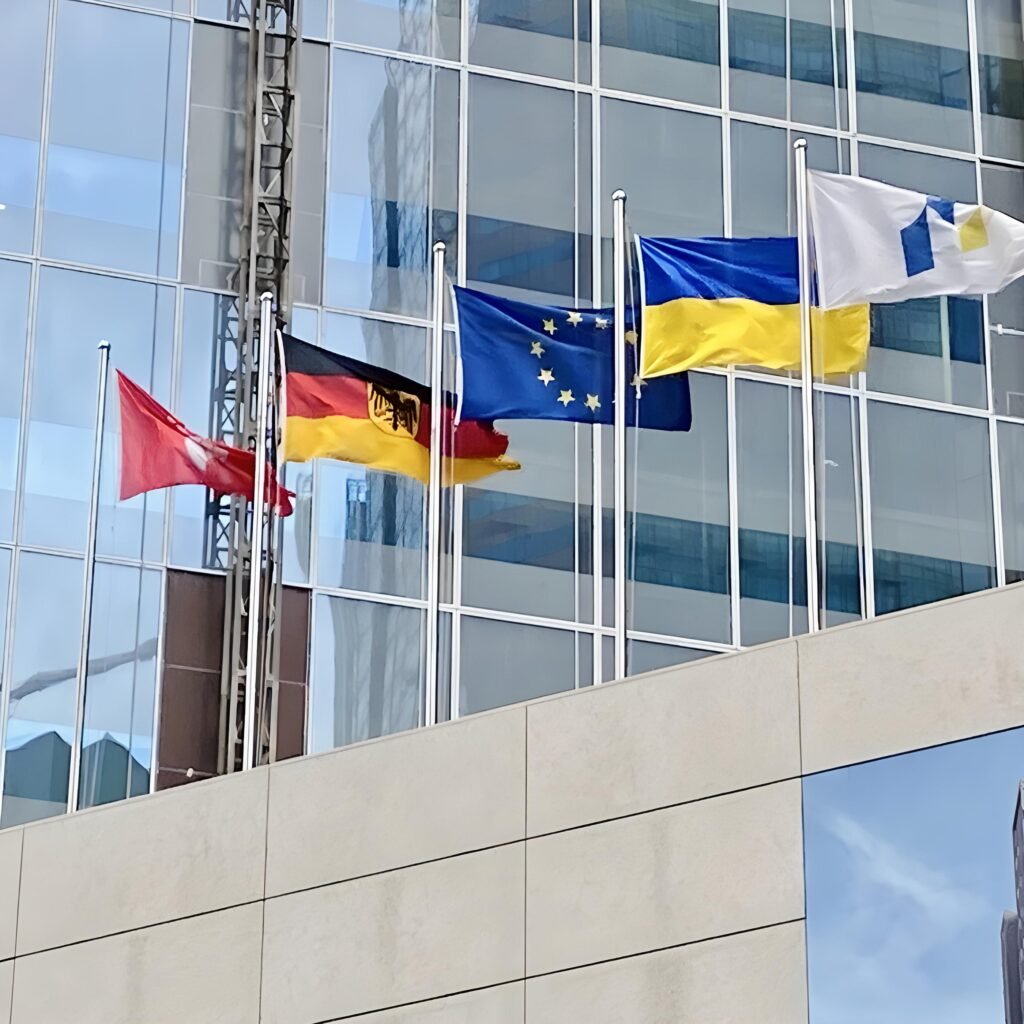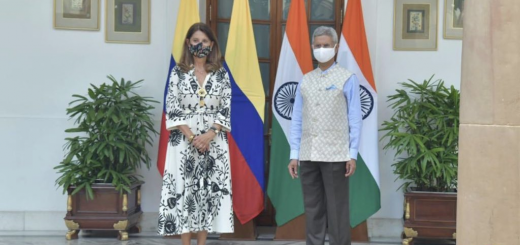The Impact of the Ukraine Conflict on Germany’s Foreign Policy: An Interview with Peter Beyer MP
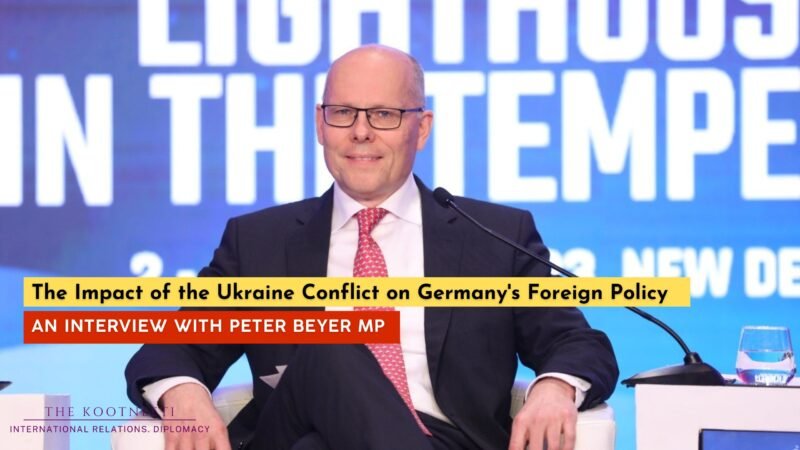
The ongoing Russia-Ukraine conflict has been a matter of international concern since it reignited in February 2022. The war started anew when Russia invaded Ukraine calling it a ‘Special operation’ and a war which is initiated to ‘Denazifying Ukraine’. A year on, the conflict which shows no signs of ending has resulted in the loss of thousands of lives and the displacement of millions of people.
The international community has been engaged in efforts to resolve the conflict, with the European Union imposing sanctions on Russia and supporting Ukraine’s territorial integrity. Germany, as a key player in the EU, has been at the forefront of these efforts, playing a crucial role as a member of NATO in the ongoing conflict in Europe with Russia.
During the Raisina Dialogue, a multilateral conference focused on international relations and security, German MP Peter Beyer spoke exclusively with The Kootneeti in an interview facilitated by the Konrad-Adenauer-Stiftung India Office about the impact of the ongoing Russia-Ukraine war on Germany and Europe as a whole. Mr. Beyer is a member of the Bundestag, the German federal parliament, and is known for his expertise in foreign affairs and security issues.
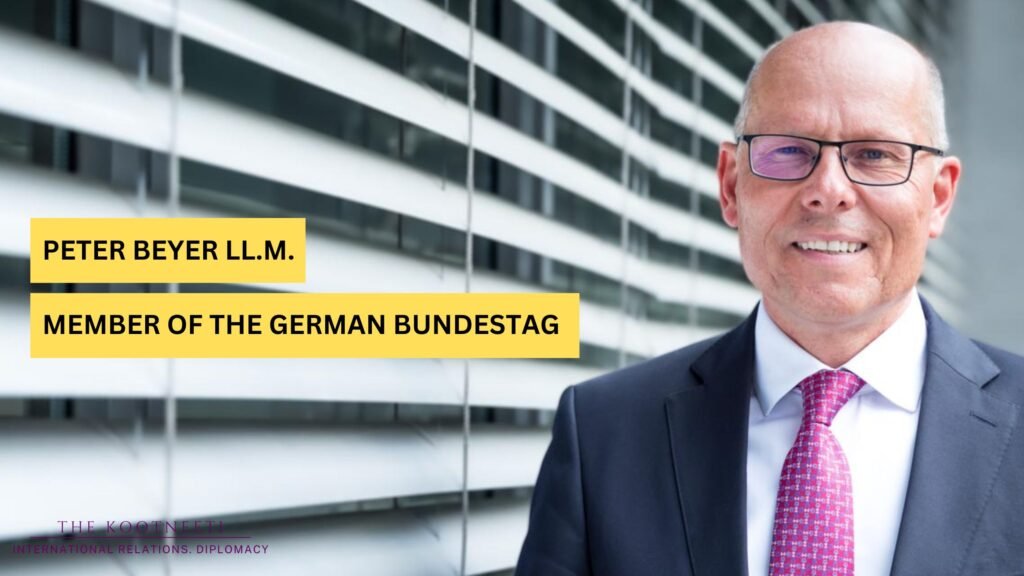
Question: What does Germany think about the ongoing war and especially its future course? However, how did Germany see itself in the post-war future of Europe?
Answer: German MP Mr Beyer expressed his belief that the unprovoked war of aggression by Russia against Ukraine has resulted in significant changes, not only for Ukraine but also for Europe as a whole. He emphasized that the conflict has shattered the international rules-based order and has cost hundreds of thousands of lives.
Mr Beyers noted that, although the war has been ongoing for over a year, nobody initially thought it would take so long or result in such high casualties. He emphasized the need to eventually stop the conflict but acknowledged that negotiations with Russia have been difficult due to their unwillingness to compromise.
Mr Beyer expressed concern that Russia wants to achieve victory and maintain control over the territories they have occupied in Ukraine since 2014. He stated that it is important to recognise that the conflict is not just between the West and Russia, but also involves the brave people of Ukraine who are fighting for their way of life and defending Western values such as human rights, rule of law, democracy, and territorial integrity.
Mr Beyer emphasized that Putin would not stop the conflict even if negotiations were to occur, as he would see himself as a victor and continue to expand his sphere of influence into other regions, such as Transnistria, Moldova, and beyond. Therefore, he believes that an end to the conflict must be an honest and fair resolution that does not involve giving up on the Donbas or Crimea, as this would only confirm Putin’s approach to expanding his sphere of influence.
In terms of Germany’s role in the post-war future of Europe, Mr Beyer believes that Germany must take a leading role in the reconstruction of Ukraine. He stated that Germany should coordinate with other European countries and international organizations such as the Organization for Security and Co-operation in Europe (OSCE) to ensure effective reconstruction efforts. Mr Beyer also noted that he has received inquiries from German businesses interested in assisting with reconstruction efforts in Ukraine.
He also emphasized that there is much work to be done to rebuild Ukraine and that it will take decades to restore the country to its former state. However, Mr Beyer believes that with the right political decision-making and coordination among allies, it is possible to achieve a positive outcome in the aftermath of the conflict.
Question: What has been the impact of the war in Ukraine on Germany’s foreign policy, and how has this affected its relationship with other European countries?
Answer: According to the German MP, the war in Ukraine has had a significant impact on the foreign policies of Germany and Poland, which has also affected their relationships with other European countries. Germany, in particular, has completely reversed its previous approach of being soft on Russia due to the war. While Germany still believes in the importance of peace talks, it has become apparent that this approach alone is not enough to address the current situation.
Mr Beyer highlighted that the German Chancellor, Scholz, attempted to persuade Vladimir Putin to change his actions by travelling to Moscow. However, at the same time, Putin was already making decisions behind the scenes to invade Ukraine. This highlights the urgency of the situation and the need for quick decision-making in foreign policy.
The war has also resulted in a shift in Germany’s policy towards delivering weapons to conflict zones. Germany had a strict doctrine of not delivering weapons to any conflict or war zones, especially due to its dark history and the atrocities committed in Ukraine during World War II. However, due to the responsibility Germany feels towards enabling Ukrainians to defend themselves, this doctrine has been changed. This change has been controversial and took longer than necessary, resulting in the loss of human lives. Nonetheless, the majority of Germans feel that the government had taken too long to act.
Mr Beyer believes the war in Ukraine has had a profound impact on the foreign policies of Germany and Poland. It has highlighted the need for quick decision-making, even when such decisions may be controversial. It has also emphasized the importance of taking responsibility for enabling vulnerable nations to defend themselves, especially in the face of historical atrocities. Mr Beyer emphasizes that European countries, particularly Germany, need to show more leadership in this situation. This requires making quick decisions based on informed decision-making, even if these decisions may be controversial. If acted upon sooner, the war may have ended sooner.
Follow up: So, was it more like moving from idealism to realism?
Answer: According to Mr Beyer, the impact of war in Ukraine on Germany’s foreign policy was not a shift from idealism to realism, but rather a realization that their approach towards Russia needed to change. Germany had always believed in convincing peace talks and had been hesitant to take a strong stance against Russia. However, the invasion of Ukraine led to a complete turnaround in their foreign policy, with Germany delivering weapons and heavy weaponry to Ukraine, something they had previously avoided due to their dark history during the second world war.
The German government took some time to make this decision, which cost human lives, but it was ultimately a recognition of their special responsibility towards Ukraine. The delay in making this decision was criticized, and it was acknowledged that Germany needed to show more leadership and make quick decisions based on informed intelligence.
He explained that one of the core pillars of Germany’s foreign policy was always the transatlantic relations, which includes trade relations and cultural relationships with the United States and Canada. He also considered European politics as a part of foreign policy, as everything within their territorial borders could be considered foreign.
Mr Beyer emphasized that Germany’s foreign policy had always been based on strong relationships with the United States, as their sheer existence was a security guarantee from America. He acknowledged that their previous approach towards Russia was not effective in protecting their interests or the interests of their allies in Europe, which led to a change in their foreign policy. Mr Beyer stated that he wouldn’t say there was idealism, but maybe a bit of blindness or naivety. He described the war in Ukraine as a rude awakening for Germany.
Question: To what extent has the conflict in Ukraine sparked a renewed interest in the importance of collective security and the role of international organizations such as NATO and the UN?
Answer: German MP’s remarks suggest that the conflict in Ukraine has prompted a renewed interest in collective security and the role of international organizations like NATO and the UN. He notes that there was a sense of complacency before the conflict erupted, with many people assuming that there would never be a war in their vicinity. However, the conflict has shown that collective security is essential and that it is better to be a part of a security club that is focused on defence rather than aggression.
Mr Beyer emphasizes the importance of international organizations like OSCE and the United Nations. He believes that these organizations are underestimated and that they can play an important role in promoting peace and security. He notes that Russia is a member of OSCE and that it is a good institution, although it is somewhat dysfunctional. Mr Beyer suggests that OSCE could play a more significant role in moderating peace, particularly in the context of the conflict in Ukraine.
Mr Beyer also comments on the role of the United Nations. He acknowledges that the organization has flaws, but he believes that it is a fantastic institution that does a lot of good. He suggests that the United Nations should be reformed and strengthened to become a more active player in global security. However, he notes that this will be a challenging task, given the different systems and interests of the member nations.
He also highlights the changing role of the United States in Europe. He notes that under the presidency of Barack Obama, there was a clear tendency for the United States to look beyond Europe towards the Pacific Ocean. However, Mr Beyer emphasizes that transatlantic relations are still crucial and that the United States remains a vital ally for Europe. He suggests that the United States needs Europe, just as Europe needs the United States.
He also highlighted the importance of collective security and international organizations like NATO and the UN in promoting global peace and security. He emphasizes the need to strengthen these institutions and suggests that reforming the United Nations could be an important step in this direction and stressed the importance of transatlantic relations and the continued role of the United States as a key ally for Europe.
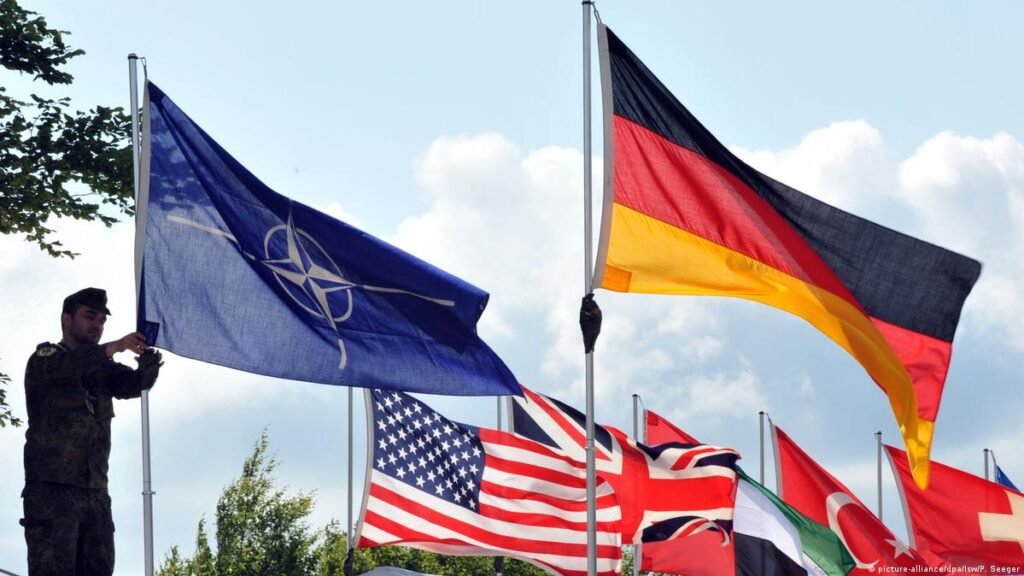
Question: How has the United States’ role in arming Ukraine affected Europe’s ability to resist the Russian invasion, and what impact has this had on Europe’s perception of American military power?
Answer: Mr Beyer who was the transatlantic coordinator of the German government during the Trump administration, believes that despite the ongoing conflict in Ukraine, it is important to strengthen the transatlantic relationship between Europe and the United States. He argues that while Europe should pursue greater independence in terms of security, this should not lead to a complete decoupling from the US. According to Mr Beyer, the idea of strategic autonomy for the European Union is “stupid”, and European sovereignty can only be built with a strong investment in the transatlantic relationship.
He acknowledges that the US has played a significant role in arming Ukraine, being the largest financial donor and delivering heavy weapons. However, he also notes that there is a perception on the other side of the Atlantic that US citizens may not be fully committed to supporting Europe in this conflict, as evidenced by some voices during the campaign for the midterm elections. Mr Beyer believes that Europe needs to take the lead in supporting Ukraine and not rely solely on the US.
Follow up: In what ways has Europe’s dependence on the United States for military support been highlighted by the conflict in Ukraine, and if Europe will consider taking steps in future to reduce this military dependency?
Answer: While Europe needs to boost its defence industry and pursue strategic European sovereignty, Mr Beyer argues that this can only be achieved with the knowledge, technology, and transatlantic defence cooperation that the US provides. Therefore, he emphasizes the need for Europe to invest in the transatlantic relationship and to do much more to support Ukraine, reducing its military dependency on the US.
Question: Where do countries like India or the Global Southfit in Europe’s policy which took almost neutral stand to balance its ties as well as push for an independent foreign policy? What is Germany’s vision for G4 as recently its representative conveyed a message for a reformed UNSC? And how will Europe perceive this change?
Answer: Mr Beyer discussed Germany’s stance towards the Global South in terms of foreign policy in a recent interview. He believes that the term “global south” is not accurate and countries in this region should not be grouped together as if they are all the same and believes that it is important to recognize that these countries have something to offer.
Mr Beyer mentioned India as an example and stated that it is currently the largest democracy on the planet, with a population of 1.48 to 1.5 billion citizens. He thinks that it is urgent to seek new partnerships and allies with countries such as India and Latin American nations. However, he also warns against falling into the “Chinese debt trap,” where some countries have created a large dependency on China and are struggling to pay back loans.
Mr Beyer emphasizes the need for a strategy on how to cooperate with these countries on a level playing field, without neo-colonialism or exploiting their resources. He believes that there is potential for a win-win situation, particularly in areas such as renewable energy, hydrogen infrastructure, and investments.
Regarding Germany’s vision for the G4 and the reform of the United Nations Security Council (UNSC), Mr Beyer argues that there is a huge appetite for reform of the UN in general, particularly as the UNSC no longer reflects the realities of the world. Mr Beyer suggests that a permanent seat for the European Union with rotating leading countries would be fairer and better reflect the realities of the world. He said the same to be true for India, the largest democracy in the world with 1.4 billion people.
MP Peter Beyer provided incisive responses during his recent interview, touching on a range of pressing political topics. He particularly emphasized the significance of sovereignty, as well as Germany’s foreign policy and its anticipated trajectory in a post-war European landscape.


